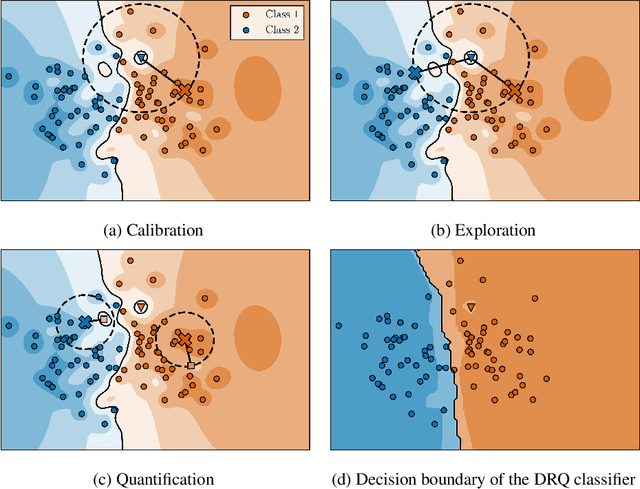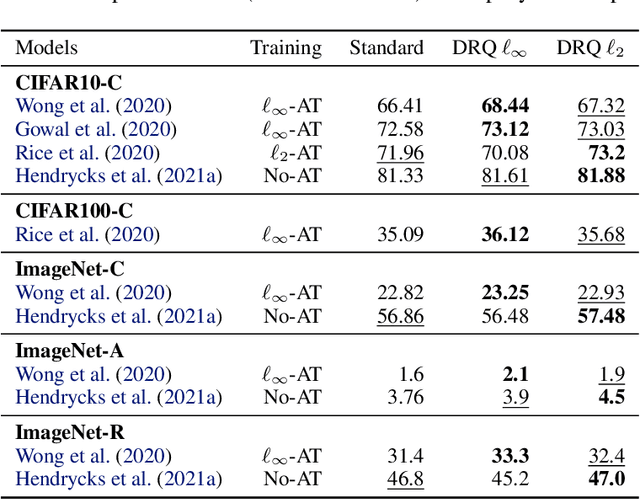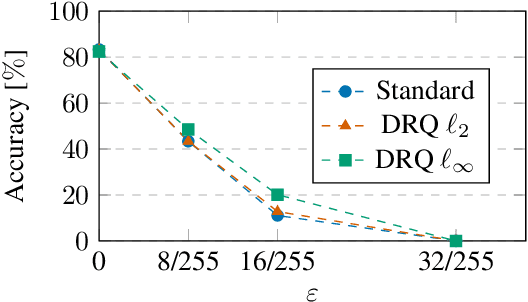Falk Pulsmeyer
Improving Robustness against Real-World and Worst-Case Distribution Shifts through Decision Region Quantification
May 19, 2022



Abstract:The reliability of neural networks is essential for their use in safety-critical applications. Existing approaches generally aim at improving the robustness of neural networks to either real-world distribution shifts (e.g., common corruptions and perturbations, spatial transformations, and natural adversarial examples) or worst-case distribution shifts (e.g., optimized adversarial examples). In this work, we propose the Decision Region Quantification (DRQ) algorithm to improve the robustness of any differentiable pre-trained model against both real-world and worst-case distribution shifts in the data. DRQ analyzes the robustness of local decision regions in the vicinity of a given data point to make more reliable predictions. We theoretically motivate the DRQ algorithm by showing that it effectively smooths spurious local extrema in the decision surface. Furthermore, we propose an implementation using targeted and untargeted adversarial attacks. An extensive empirical evaluation shows that DRQ increases the robustness of adversarially and non-adversarially trained models against real-world and worst-case distribution shifts on several computer vision benchmark datasets.
SVC-onGoing: Signature Verification Competition
Aug 13, 2021



Abstract:This article presents SVC-onGoing, an on-going competition for on-line signature verification where researchers can easily benchmark their systems against the state of the art in an open common platform using large-scale public databases, such as DeepSignDB and SVC2021_EvalDB, and standard experimental protocols. SVC-onGoing is based on the ICDAR 2021 Competition on On-Line Signature Verification (SVC 2021), which has been extended to allow participants anytime. The goal of SVC-onGoing is to evaluate the limits of on-line signature verification systems on popular scenarios (office/mobile) and writing inputs (stylus/finger) through large-scale public databases. Three different tasks are considered in the competition, simulating realistic scenarios as both random and skilled forgeries are simultaneously considered on each task. The results obtained in SVC-onGoing prove the high potential of deep learning methods in comparison with traditional methods. In particular, the best signature verification system has obtained Equal Error Rate (EER) values of 3.33% (Task 1), 7.41% (Task 2), and 6.04% (Task 3). Future studies in the field should be oriented to improve the performance of signature verification systems on the challenging mobile scenarios of SVC-onGoing in which several mobile devices and the finger are used during the signature acquisition.
ICDAR 2021 Competition on On-Line Signature Verification
Jun 01, 2021

Abstract:This paper describes the experimental framework and results of the ICDAR 2021 Competition on On-Line Signature Verification (SVC 2021). The goal of SVC 2021 is to evaluate the limits of on-line signature verification systems on popular scenarios (office/mobile) and writing inputs (stylus/finger) through large-scale public databases. Three different tasks are considered in the competition, simulating realistic scenarios as both random and skilled forgeries are simultaneously considered on each task. The results obtained in SVC 2021 prove the high potential of deep learning methods. In particular, the best on-line signature verification system of SVC 2021 obtained Equal Error Rate (EER) values of 3.33% (Task 1), 7.41% (Task 2), and 6.04% (Task 3). SVC 2021 will be established as an on-going competition, where researchers can easily benchmark their systems against the state of the art in an open common platform using large-scale public databases such as DeepSignDB and SVC2021_EvalDB, and standard experimental protocols.
 Add to Chrome
Add to Chrome Add to Firefox
Add to Firefox Add to Edge
Add to Edge